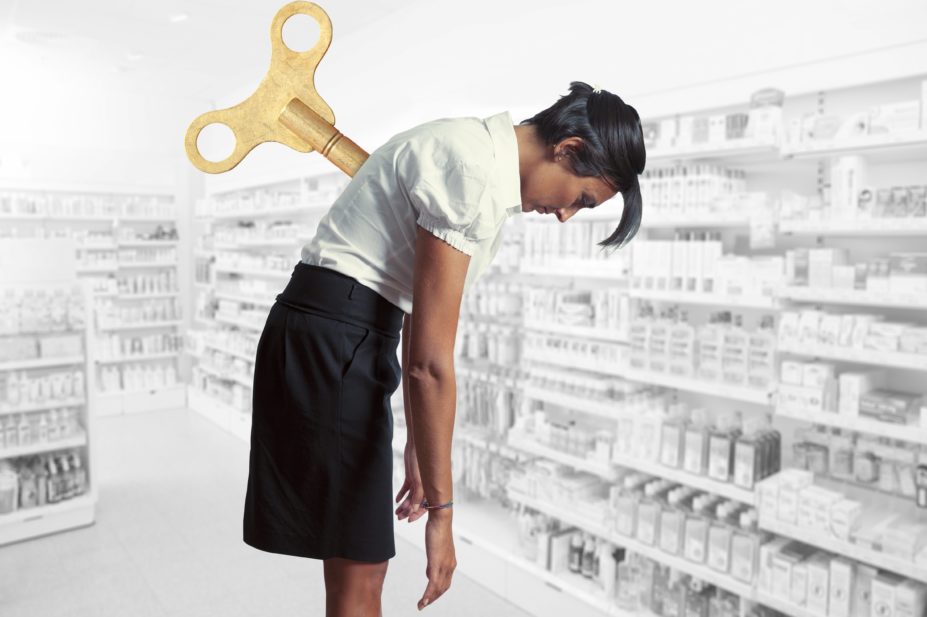
The problem
A pharmacist reveals to you that they have recently been experiencing increasing stress at work and at home.
Despite being short-staffed, their employer recently announced that, owing to increasing financial pressures, the existing vacancies within their team will not be filled. This has meant working longer shifts and the pharmacist being away from their young family to ensure the work gets done.
They confide in you that they are getting tension headaches, with increasing frequency, and experiencing anxiety and low mood. They often feel too unwell to go to work and do not take any days off because they feel pressured to be at work. They are unsure how long they can continue working in this way without it further affecting their physical and mental wellbeing, the safety of their patients, and the relationships they have with their family.
What advice would you give to this pharmacist?

Courtesy of Harpreet Chana
“If you do not look after yourself first, you will not be able to look after anyone else”
Ask yourself: what would you say to a patient in your pharmacy that had the exact same problem? Why are you any different? You must prioritise your own health: without it, you are no good to your patients. You have said that you cannot carry on this way, so something will have to give. Rather than waiting for that ‘something’ to happen, it is better to take control of the situation now.
Have an open and frank conversation with your employer about what has been going on. Explain that the stress at work has become too much and you are worried about the impact on your mental health. Also explain that you understand the financial constraints, but that the reduction in staff hours means you are having to work longer shifts.
Employers respond to solutions — write down some ideas or a potential compromise on how you can reduce your workload before you meet. Ask yourself: are you delegating effectively? Are you doing things just because it is easier for you to do them, rather than train others to do them? If you work in a community pharmacy, could you manage workload by asking local surgeries to adopt more repeat dispensing?
Work with your employer to come up with a more effective way of working. It may involve training staff, but that will be cheaper than hiring new staff members in the long run and can improve your productivity as a team too. Try to involve your team in some of these conversations — the best ideas can come from the people you least expect.
Start practising better self-care. If you do not look after yourself first, you will not be able to look after anyone else. If time off is what you need to recuperate, mentally and physically, then take it. It is better to take a week or two now, rather than taking time off months later if you push yourself towards a breakdown.
Go for a 10–15 minute walk on your lunch break or see if you can fit this in at some point during the day to clear your head. There are also several mindfulness apps that can help you to stay calm and focused during the day through short, guided meditation sessions.
The charity Pharmacist Support is also available to provide advice and support.
Harpreet Chana is founder of the Mental Wealth Academy, which aims to reduce the impact of mental illness on businesses and individuals.

Courtesy of Paul Day
“Your physical and mental health should come first”
Thank you for having the courage to talk about your situation.
The Pharmacists’ Defence Association (PDA) is confidential and here to support you, so you can feel comfortable in being honest with us.
We understand that you are trying to place caring for patients and being there for colleagues at the top of your priorities, but your physical and mental health should come first. Ignoring symptoms is not a good approach and seeing a doctor to assess your health is a sensible action to take.
For help with stress we recommend Pharmacist Support in Britain and the Pharmacist Advice and Support Service in Northern Ireland as charities dedicated to helping pharmacists deal with a wide range of difficulties in life. Some employers also provide confidential counselling and advice services as an employee benefit, so please find out if that is available for you.
The PDA can explore the full details of your situation and advise you. Our approach is always to try and improve matters locally, early and without conflict, but if an employer/manager is being unreasonable, with your consent, we will progress matters as appropriate. You may also want to be aware that if your stress is “a physical or mental impairment which has a substantial and long-term adverse effect on your ability to carry out normal day-to-day activities”, then the employer could have additional legal obligations under the Equality Act to make reasonable adjustments to your job.
Paul Day is director of the Pharmacists’ Defence Association

Courtesy of Danielle Hunt
“There is help available if you reach out”
I am concerned by your problem and feel you are at a point where you need to take action.
Your wellbeing must be a priority and there is help available if you reach out. If you are unable or find it difficult to speak to friends or colleagues, you can always contact our Listening Friends volunteers. As pharmacists themselves, they understand the pressures of the role.
Should you feel you need more than this, speak to your GP. While we understand that you are concerned about patients not receiving medication and services, it is important you recognise as a pharmacist when you are not well enough to work.
Although your employer has said that they are financially unable to recruit more staff, they have a duty of care and a responsibility to ensure safe working conditions for employees — this includes a contingency plan to cover absences for illness and holidays.
Presenteeism is just as much of a risk as staff sickness. It can lead to poor productivity, long-term sickness and, of course in your case, errors, fitness-to-practice proceedings and patient harm.
Raise your concerns with your employer. It may be that they are not fully aware of the extent of your workload or realise that you are feeling overwhelmed.
A technique we share in our wellbeing workshops — which may be good to do ahead of the meeting with your employer — is to create a list of all the tasks you cover, separating them out into what is urgent and important, and what is not urgent and not important. This can help you take control of your time and be more effective in achieving or completing those essential tasks. It may also help you delegate some of the less important things on your list. From here you can hopefully agree your priorities with your employer, as well as any tasks that may be delegated or become the responsibility of other competent professionals. However, if you feel your concerns are being ignored, you may wish to seek advice from your trade union (if you are a member) or Pharmacist Support’s employment adviser. There are also fitness-to-practise legal advisers who may be able to provide free guidance on patient safety.
Danielle Hunt is chief executive for Pharmacist Support

Courtesy of Rachel Quinlan
“You should only be working if you are fit to do so”
I can appreciate it is difficult not to feel that you are letting others down by taking time off work for any reason, but particularly sickness. Pharmacists often struggle on, out of duty and compassion for their teams and patients.
However, you should assess the risks of presenteeism to your own health, safety and wellbeing and of those using your services. You should only be working if you are fit to do so.
You should consider that:
- If you are the Responsible Pharmacist, you must ensure the safe and effective running of the pharmacy;
- Application of General Pharmaceutical Council (GPhC) Standard 9 indicates that people receive safe and effective care when pharmacy professionals assess the risk in the care that they provide to identify potential issues;
- Looking at your existing staffing structure;
- Some jobs could be delegated to suitably competent colleagues, or following appropriate training;
- Some pharmacy services could be prioritised or restricted in order to safeguard patient safety;
- GPhC Standard 8 indicates that pharmacy professionals must speak up when they have concerns or when things go wrong. Therefore, raise your concerns with your employer/superintendent pharmacist to address the problem, explaining that your health is being affected and offer possible solutions. Other contacts include your HR department, trade union or indemnity provider.
Looking after your personal wellbeing:
- Seek advice for any health issues and symptoms you are experiencing to avoid them worsening;
- Take time out — you are entitled to your breaks and, if possible, leave the premises. Mistakes are more likely to occur if you are unwell or stressed;
- Make time for your family, friends, hobbies, health and wellbeing.
Rachel Quinlan is a professional support pharmacist at the Royal Pharmaceutical Society (RPS), where the RPS Professional Support team is available for confidential advice at 020 7572 2737 (Monday to Friday, 09:00–17:00) or at support@rpharms.com.



